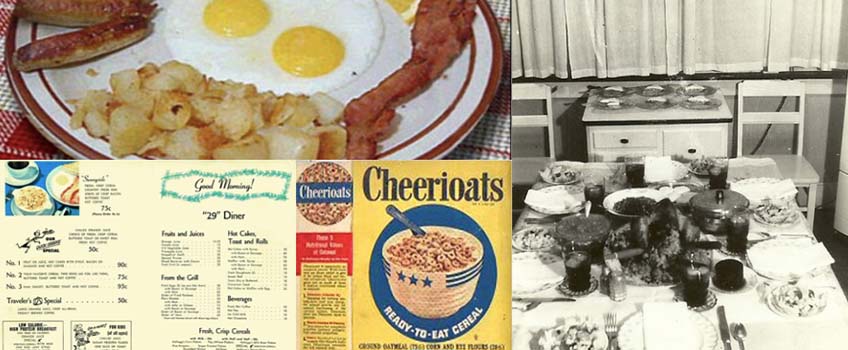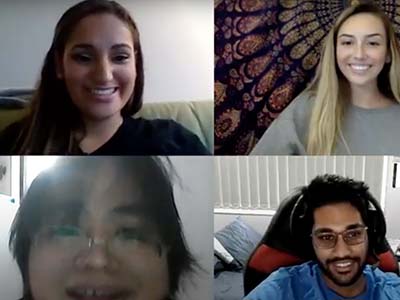Students collaborate with peers around the world

Stockton students shared their research on breakfast and learned about New Zealand customs and culture through a collaboration with an Auckland University of Technology class on gastronomy. Above: a slide from Avery Specchio's project. Below: Caroline Sparacino and Carlee Bellapigna from Stockton (top row left and right) Zoom with Dan Nyugen, and Yash Kumar, from the Auckland University of Technology (bottom row, left and right)
Galloway, N.J. - What’s for breakfast?
It’s a simple enough question, but a much more complicated answer when the responses come from people living in different cultures and countries.
While some students may get the opportunity to study, and eat breakfast, abroad, Stockton’s Interim Director of the Office of Global Engagement JY Zhou also looks for other ways to introduce and connect students to other cultures.
 This year she has partnered Stockton classes with students in Mexico, Colombia, Egypt
and New Zealand through Collaborative Online International Learning, or COIL.
This year she has partnered Stockton classes with students in Mexico, Colombia, Egypt
and New Zealand through Collaborative Online International Learning, or COIL.
“I’ve been doing COIL projects for a while,” Zhou said. “We’ve been looking for more ways to connect virtually, making international education more inclusive and introducing more students to other countries.”
Topics have included marijuana legalization, which was also being voted on in Mexico, cultural diversity, global education, and, yes, even breakfast.
This semester Zhou assisted Heather Swenson Brilla, who teaches an Introduction to Sociology class, in partnering with students at the Auckland University of Technology (AUT) for a project on breakfast and what it tells us about societies.
“Breakfast really is a concrete example of a social construction," said Swenson Brilla, who is also Community Projects Coordinator at the Center for Community Engagement and Service Learning at Stockton. “There is really no such thing as a ‘breakfast food.’ We all decide what that means and it has changed over time.”
Students in the Senior Lecturer Lindsay Neill’s Master of Gastronomy class at AUT collaborated through Zoom with the Stockton class to learn more about each other’s customs, from Pop Tarts to Anzac biscuits.
“In the process they also learned about family life,” Swenson Brilla said. “We are maximizing learning opportunities for students who would not get to go there. Our students learned so much.”
The Stockton students studied the evolution of breakfast and the proliferation of convenience foods as more women entered the workforce.
Stockton Student Brianna Mincolelli said in New Zealand, American products are sold in special international food stores.
“This project was a lot of fun,” Mincolelli said. “The girl I interviewed said brand named products like Pepsi and Doritos taste much different there. She said they taste worse, due to them not having as much sugar in their products as we do. It was interesting to put things into perspective.”
Student Avery Specchio said it was interesting to learn about the country through something as prominent and universal as breakfast.
“I learned a lot about the New Zealand culture and had great conversations with the students and my peers,” she said.
Carlee Bellapigna said that while we often hear the phrase that breakfast is the most important meal of the day, what we sometimes tend to overlook is why the relationship we have with food, and the people we share it with, are so important.
“Working with students in New Zealand afforded us the opportunity to better understand and appreciate how we experience our meals differently, but also bond over the meaning shared in our lives,” Bellapigna said. “I think that’s the most amazing part, reflecting and taking the time to learn about cultures different from your own. You connect with others while also learning more about yourself.”
The Office of Global Engagement is hosting several virtual events during International Education Week Nov. 16-20. More information is on the Global Engagement website.
# # #
Contact:
Diane D’Amico
Director of News and Media Relations
Galloway, N.J. 08205
Diane.D’Amico@stockton.edu
609-652-4593
609-412-8069
stockton.edu/media


